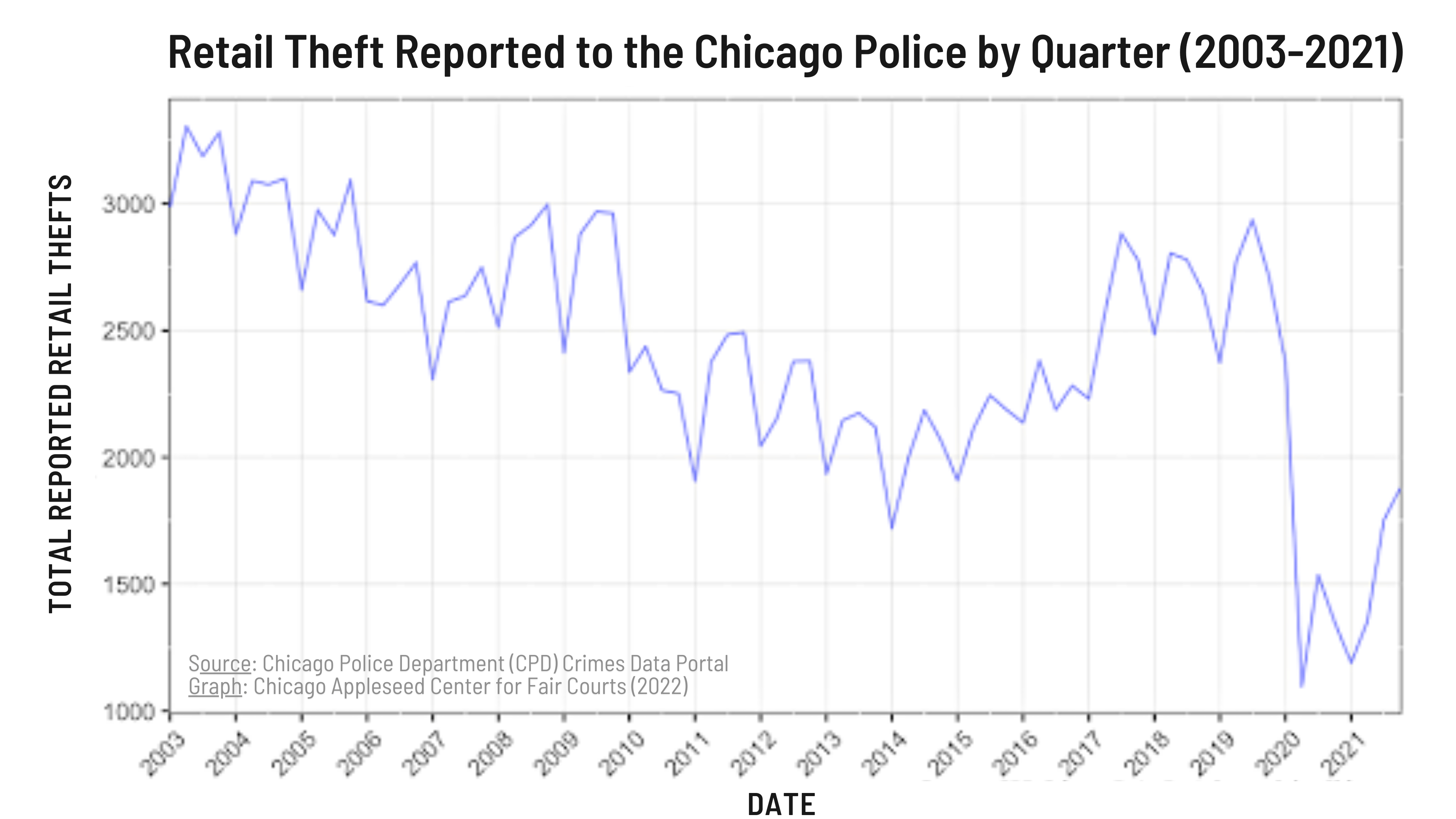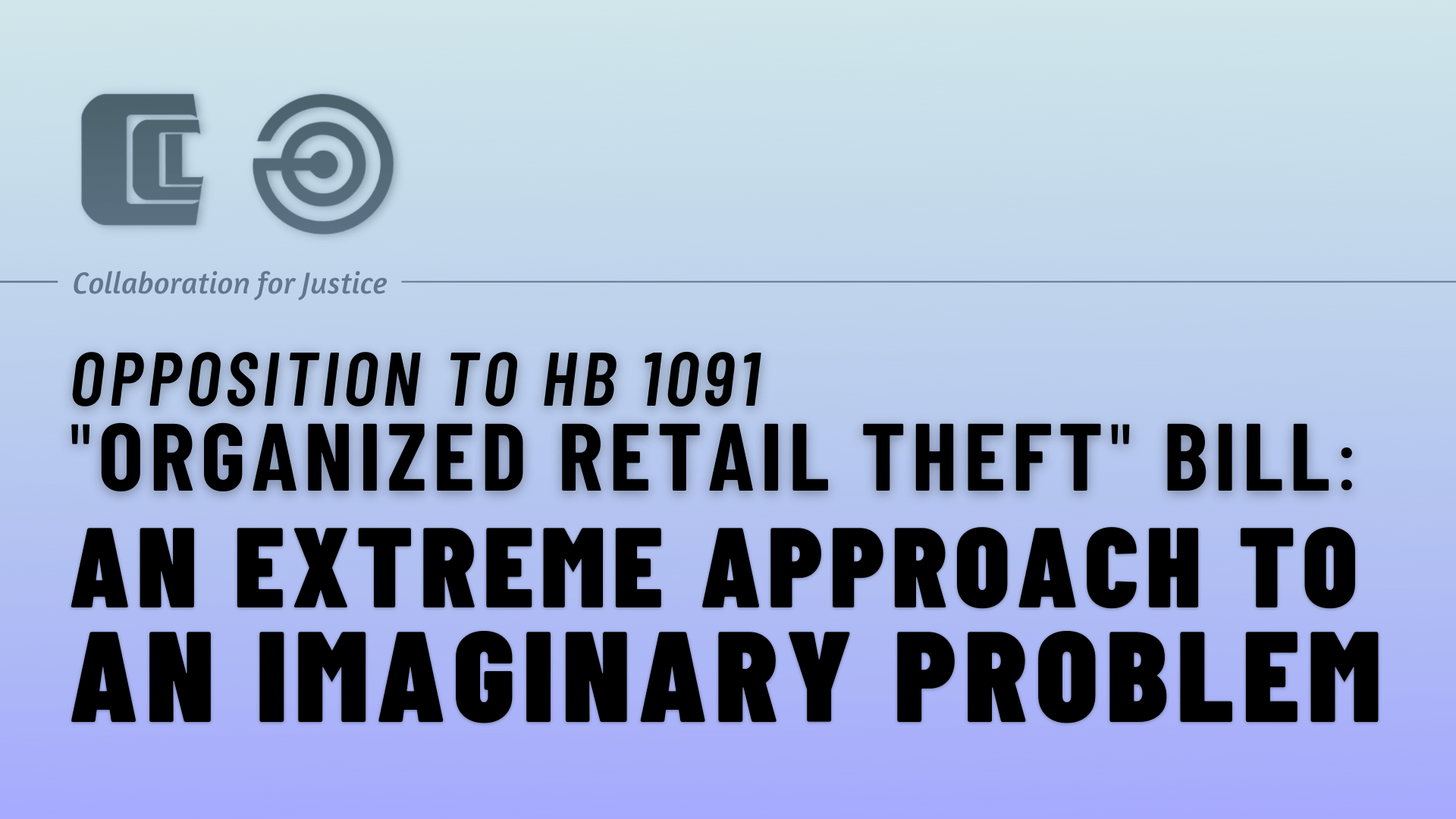“Organized Retail Theft” Bill is an Extreme Approach to an Imaginary Problem
This week, the Illinois Retail Merchants’ Association succeeded in convincing the Illinois General Assembly to introduce legislation targeted at reducing “organized retail theft.” Chicago Appleseed Center for Fair Courts and the Chicago Council of Lawyers vehemently opposed the bill, HB 1091, which is one of the most regressive pieces of criminal legal system legislation to be introduced in the General Assembly in years. HB 1091 targets people who are alleged to have engaged in a non-violent crime where a business is the victim – retail theft – by ascribing higher penalties than those for people who steal from another human being (and penalties higher even than those for domestic violence or battery).
Retail theft – and all the behavior described in the new “organized retail theft” law – is when someone steals merchandise from a store, while the store is open, without using or threatening to use any force. It is the quintessential non-violent crime. For years, legislators and State’s Attorneys in Illinois have followed research that recognizes that retail theft is a symptom of “financial deprivation” (poverty), substance use, and/or mental health issues, which has been a generally successful public policy approach.
Instances of retail theft are at their lowest levels in decades. After plummeting in frequency during the pandemic, the incidence of retail thefts in Chicago rebounded in 2021 but remains at one of the lowest levels this century – 43% lower than in 2019.

Illinois has one of the lowest felony retail theft “thresholds” in the country: a conviction of a retail theft of only $300 (in today’s market, often a single item) can subject someone to a permanent felony conviction and up to three years in prison. Only two states have a lower felony threshold; most other states have retail theft thresholds of $1,000 or higher.
Although Illinois already over-punishes retail theft, this bill seeks to increase penalties by adding language about “aggravators” (a characteristic of an offense that means that a person faces more serious penalties) that will apply to a huge swath of alleged retail thefts. Despite rhetoric, HB 1091 will not target “the worst of the worst” retail thefts—it will target all shoplifting. For instance, if someone puts merchandise into a bag (something that would surely apply to nearly all instances of retail theft); is with another person; shoplifts merchandise from a truck or vehicle outside of an establishment; triggers an emergency alarm; removes anti-shoplifting tags; or damages property while allegedly shoplifting, they would face a higher sentence for retail theft under the bill.
HB 1091 also gives businesses rights that go beyond those afforded to victims of violence under the Rights of Crime Victims and Witnesses Act (RCVWA). The actual purpose of the RCVWA is to make sure that individuals who have experienced harm – often life changing harm like sexual violence or the murder of a family member – are given a voice in legal proceedings. Using the protections of the RCVWA to protect property, rather than people, and afford enhanced protections to corporate spokespeople for retail merchants is an absurd perversion of victims’ protections.
This law does not describe a new crime called “organized retail theft,” instead, it attempts to use harsh penalties to increase punishments for run-of-the-mill, non-violent shoplifting.
Shoplifting is a behavior that has its roots in poverty—which would only be exacerbated by prioritizing higher criminal penalties of any kind. Throughout the 1980s and 1990s, sentencing enhancements were routinely used in failed efforts to deter people from breaking the law. We have learned that enhanced punishments do not, in fact, deter behaviors but contribute to the criminalization of poverty and mass incarceration. Passing HB 1091 would be an unwise and misguided attempt to quell corporate concerns without evidence-based justification. Legislators who value criminal legal system reform, or simply value proportionality in punishments for different crimes, should see this bill for what it is and oppose it.

